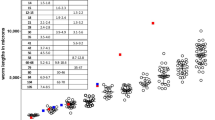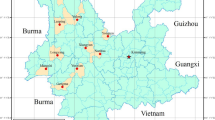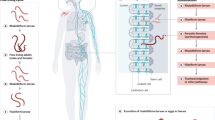Abstract
THE metastrongylid lung-worm, Angiostrongylus cantonensis (Chen), was described from rats at Canton1, reported by Yokogawa from Formosa2, and has been found in about 5 per cent of wild brown rats, Rattus norvegicus (Erxl.), in Brisbane. It is now being maintained as a laboratory infection in white rats. The life-history shows some remarkable features.
This is a preview of subscription content, access via your institution
Access options
Subscribe to this journal
Receive 51 print issues and online access
$199.00 per year
only $3.90 per issue
Buy this article
- Purchase on Springer Link
- Instant access to full article PDF
Prices may be subject to local taxes which are calculated during checkout
Similar content being viewed by others
References
Chen, H. T., Ann. Parasitol., 13, 312 (1935).
Yokogawa, S., Trans. Nat. Hist. Soc. Formosa, 27, 247 (1937).
Author information
Authors and Affiliations
Rights and permissions
About this article
Cite this article
MACKERRAS, M., SANDARS, D. Life-history of the Rat Lung-worm and its Migration through the Brain of its Host. Nature 173, 956–957 (1954). https://doi.org/10.1038/173956a0
Issue Date:
DOI: https://doi.org/10.1038/173956a0
This article is cited by
-
CNS infection and immune privilege
Nature Reviews Neuroscience (2018)
-
Angiostrongylus cantonensis: An optimized cultivation of this parasitic nematode under laboratory conditions
Parasitology Research (2017)
-
Light and electron microscopic studies on two nematodes, Angiostrongylus cantonensis and Trichuris muris, differing in their mode of nutrition
Parasitology Research (2007)
Comments
By submitting a comment you agree to abide by our Terms and Community Guidelines. If you find something abusive or that does not comply with our terms or guidelines please flag it as inappropriate.



